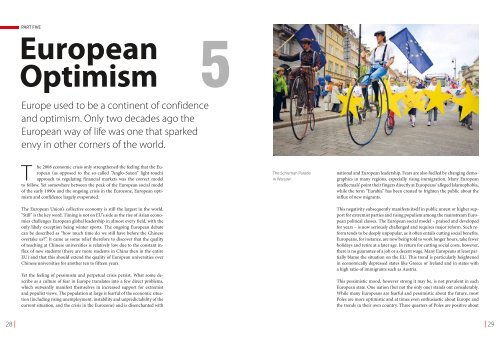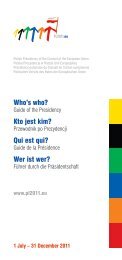„The Brighter Side of Europe” / Piotr Kaczyński
„The Brighter Side of Europe” / Piotr Kaczyński
„The Brighter Side of Europe” / Piotr Kaczyński
Create successful ePaper yourself
Turn your PDF publications into a flip-book with our unique Google optimized e-Paper software.
PART FIVE<br />
European<br />
Optimism<br />
Europe used to be a continent <strong>of</strong> confidence<br />
and optimism. Only two decades ago the<br />
European way <strong>of</strong> life was one that sparked<br />
envy in other corners <strong>of</strong> the world.<br />
T<br />
he 2008 economic crisis only strengthened the feeling that the European<br />
(as opposed to the so-called “Anglo-Saxon” light-touch)<br />
approach to regulating financial markets was the correct model<br />
to follow. Yet somewhere between the peak <strong>of</strong> the European social model<br />
<strong>of</strong> the early 1990s and the ongoing crisis in the Eurozone, European optimism<br />
and confidence largely evaporated.<br />
The European Union’s collective economy is still the largest in the world.<br />
“Still” is the key word. Timing is not on EU’s side as the rise <strong>of</strong> Asian economies<br />
challenges European global leadership in almost every field, with the<br />
only likely exception being winter sports. The ongoing European debate<br />
can be described as “how much time do we still have before the Chinese<br />
overtake us?”. It came as some relief therefore to discover that the quality<br />
<strong>of</strong> teaching at Chinese universities is relatively low due to the constant influx<br />
<strong>of</strong> new students (there are more students in China then in the entire<br />
EU) and that this should extend the quality <strong>of</strong> European universities over<br />
Chinese universities for another ten to fifteen years.<br />
Yet the feeling <strong>of</strong> pessimism and perpetual crisis persist. What some describe<br />
as a culture <strong>of</strong> fear in Europe translates into a few direct problems,<br />
which outwardly manifest themselves in increased support for extremist<br />
and populist views. The population at large is fearful <strong>of</strong> the economic situation<br />
(including rising unemployment, instability and unpredictability <strong>of</strong> the<br />
current situation, and the crisis in the Eurozone) and is disenchanted with<br />
5<br />
The Schuman Parade<br />
in Warsaw<br />
national and European leadership. Fears are also fuelled by changing demographics<br />
in many regions, especially rising immigration. Many European<br />
intellectuals’ point their fingers directly at Europeans’ alleged Islamophobia,<br />
while the term “Eurabia” has been created to frighten the public about the<br />
influx <strong>of</strong> new migrants.<br />
This negativity subsequently manifests itself in public unrest or higher support<br />
for extremist parties and rising populism among the mainstream European<br />
political classes. The European social model – praised and developed<br />
for years – is now seriously challenged and requires major reform. Such reform<br />
tends to be deeply unpopular, as it <strong>of</strong>ten entails cutting social benefits.<br />
Europeans, for instance, are now being told to work longer hours, take fewer<br />
holidays and retire at a later age. In return for cutting social costs, however,<br />
there is no guarantee <strong>of</strong> a job or a decent wage. Many Europeans at least partially<br />
blame the situation on the EU. This trend is particularly heightened<br />
in economically depressed states like Greece or Ireland and in states with<br />
a high ratio <strong>of</strong> immigrants such as Austria.<br />
This pessimistic mood, however strong it may be, is not prevalent in each<br />
European state. One nation (but not the only one) stands out considerably.<br />
While many Europeans are fearful and pessimistic about the future, most<br />
Poles are more optimistic and at times even enthusiastic about Europe and<br />
the trends in their own country. Three quarters <strong>of</strong> Poles are positive about<br />
28 | | 29



